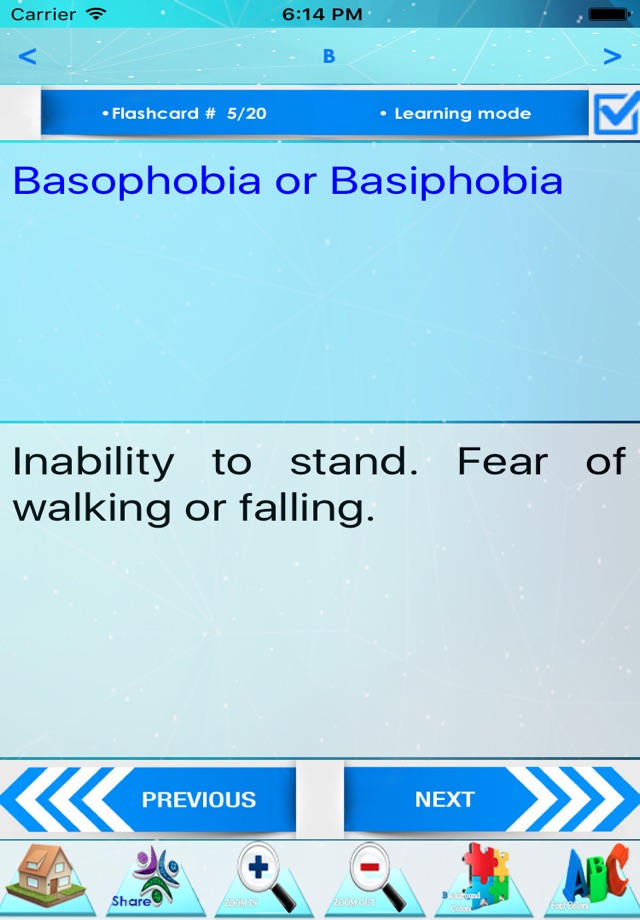
Phobiopedia: The Phobia Encyclopedia (+500 concepts)
Phobiopedia: The Phobia Encyclopedia (+500 concepts).
This app is a combination of sets, containing terms & concepts for self learning & exam preparation on the topic of Phobias & psychology.
A phobia is a type of anxiety disorder, usually defined as a persistent fear of an object or situation in which the sufferer commits to great lengths in avoiding, typically disproportional to the actual danger posed, often being recognized as irrational. In the event the phobia cannot be avoided entirely, the sufferer will endure the situation or object with marked distress and significant interference in social or occupational activities.
With this app you can learn on the Go, Anytime & Everywhere. The learning & understanding process never been so easy like with our 5 study modes embedded in this app.
Our Learners get the best, thats why they dont just meet standards, They exceed them.
Get +500 terms & definitions and Prepare & Pass Your Psychology Exam easily to guarantee the highest score.
By the end of this app we expect that you expand your knowledge, widen your expertise, improve your practical skills and Broaden your academic & career horizons.
We promise that this app will strengthen your self-confidence during the exam & daily work.
Remember that you should get the Skills you need to land the job you want.
Learn & educate your self as much as you can, knowledge is the real and best capital & assets that you own.
Invest in your Success Now. Your investment in knowledge, professionalism & expertise is durable & with a High value added. Its a High return investment.
This App energized your creativity, showcases your talents and strength your self-confidence during the exam & daily work.
You will get better understanding, less preparation time & a better score in the exam.
-This application is downloaded and used by graduate & undergraduate students, teachers, lecturers, professionals, PhD, researchers, reviewers not only in the US but also in Philippines, Canada, India, Australia, Turkey, Russia, UK, GCC, India, Saudi Arabia, Nigeria, and all over the world.
Main Features:
- +500 exam questions and study notes
- 5 study modes
- Shareable content
- Settings: with flexibility to change font size & background control.
Most phobias are classified into two categories and, according to the Diagnostic and Statistical Manual of Mental Disorders, Fifth Edition (DSM-V), such phobias are considered to be sub-types of anxiety disorder. The two categories are:
1. Specific phobias: Fear of particular objects or social situations that immediately results in anxiety and can sometimes lead to panic attacks. Specific phobia may be further subdivided into five categories: animal type, natural environment type, situational type, blood-injection-injury type, and other.
2. Agoraphobia: a generalized fear of leaving home or a small familiar safe area, and of possible panic attacks that might follow. It may also be caused by various specific phobias such as fear of open spaces, social embarrassment (social agoraphobia), fear of contamination (fear of germs, possibly complicated by obsessive-compulsive disorder) or PTSD (post traumatic stress disorder) related to a trauma that occurred out of doors.
Phobias vary in severity among individuals. Some individuals can simply avoid the subject of their fear and suffer relatively mild anxiety over that fear. Others suffer full-fledged panic attacks with all the associated disabling symptoms. Most individuals understand that they are suffering from an irrational fear, but are powerless to override their panic reaction.
A specific phobia is a marked and persistent fear of an object or situation which brings about an excessive or unreasonable fear when in the presence of, or anticipating, a specific object; the specific phobias may also include concerns with losing control, panicking, and fainting which is the direct result of an encounter with the phobia.



